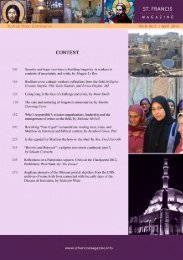download the pdf - St.Francis Magazine
download the pdf - St.Francis Magazine
download the pdf - St.Francis Magazine
Create successful ePaper yourself
Turn your PDF publications into a flip-book with our unique Google optimized e-Paper software.
<strong>St</strong> <strong>Francis</strong> <strong>Magazine</strong> Vol 8, No 4 | August 2012<br />
of a Christian but not <strong>the</strong> core identity. That is, in <strong>the</strong>ir own worldview<br />
and self-awareness, <strong>the</strong>ir Christianity is only tangential; it is not<br />
at <strong>the</strong> core of who <strong>the</strong>y are.<br />
Can we speak of “nominal Muslims” in <strong>the</strong> same way Is this a<br />
valid comparison when Islam and Christianity (or evangelical Christianity<br />
at any rate) have such different emphases on <strong>the</strong> relative importance<br />
of orthopraxis and orthodoxy Perhaps a better way of putting<br />
it would be to speak of “cultural” Muslims, embedded in Muslim<br />
majority communities and going with <strong>the</strong> flow of a religiously legitimated<br />
society without necessarily being deeply committed to Islam<br />
at a “core identity” level.<br />
However Muslims who live in a non-Islamic context, where <strong>the</strong>ir<br />
cultural assumptions are not taken for granted by wider society, are<br />
<strong>the</strong>reby prompted to distinguish between social and core identities.<br />
It is no longer so easy just to go with <strong>the</strong> flow of a Muslim social<br />
identity. This prompts migrants (or <strong>the</strong>ir children) critically to examine<br />
<strong>the</strong>ir assumptions and to make choices at <strong>the</strong> core identity level.<br />
Some decide to follow Islam in a committed, conscious way, some<br />
turn from Islam to ano<strong>the</strong>r faith or a<strong>the</strong>ism, and some continue to<br />
live with <strong>the</strong> unresolved cognitive dissonance of clashing worldviews.<br />
Thus all three identity levels have a religious element. Since Islam<br />
lays claim to all <strong>the</strong>se areas in a holistic way, those who leave it<br />
face a daunting task of renegotiating each aspect of <strong>the</strong>ir identity.<br />
3 Conversion and Identity<br />
3.1. A transformed identity at each level<br />
Our understanding of Muslim conversion to Christianity is assisted<br />
by conversion studies, which incorporates insights from such fields as<br />
psychology, sociology, anthropology, history, missiology and of<br />
course <strong>the</strong>ology. Perhaps <strong>the</strong> most influential scholar in recent years<br />
to write on <strong>the</strong> topic is <strong>the</strong> American Lewis Rambo. 74 He sought to<br />
74 Lewis Rambo, Understanding Religious Conversion (New Haven: Yale University<br />
Press, 1993).<br />
<strong>St</strong> <strong>Francis</strong> <strong>Magazine</strong> is a publication of Interserve and Arab Vision 528







![Reflections on Surah Fatiha and the Lord's Prayer[1] - St.Francis ...](https://img.yumpu.com/49377951/1/184x260/reflections-on-surah-fatiha-and-the-lords-prayer1-stfrancis-.jpg?quality=85)









